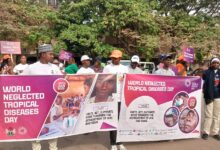124,000 Africans Die Annually From Undetected, Untreated Hepatitis – WHO

A recent survey by The World Health Organisation has shown that more than 124,000 africans die every year from the consequences of undetected and untreated hepatitis.
Dr. Matshidiso Moeti, WHO Regional Director for Africa, disclosed this in her message today, commemorating this year’s World Hepatitis Day.
TheFact Nigeria gathered that even though hepatitis vaccines were available in many countries, igorance on the part of the populace is the reason behind the high rate of mortality.
WHO ear marked 28th of July every year to celebrate World Hepatitis Day to increase awareness of this disease, which inflames the liver and can lead to liver cancer and cirrhosis. This year’s theme was “hepatitis can’t wait”.
Dr. Moeti called on all countries to rapidly improve access to services to prevent, diagnose and treat hepatitis.
She hinted that:
“In Africa, hepatitis is a silent epidemic. More than 90 million people are living with hepatitis in the Region, accounting for 26% of the global total.
“Around 4.5 million African children under five years old are infected with chronic hepatitis B, reflecting an enormous 70% of the global burden in this age group.
“The global target of less than 1% incidence of hepatitis B in children under 5 years has been reached, but the African Region is lagging behind at 2.5%”, said the Regional Director.
According to her, most of these cases could be prevented by eliminating mother-to-child transmission of the disease, during or shortly after birth and in early childhood.
She reiterated that key interventions against hepatitis B included vaccination at birth and in early childhood, screening pregnant women, and providing timely treatment.
Going further, Dr. Moeti disclosed that, mothers and their unborn children were the worst hit with the disease, hence she encouraged countries to integrate the Hepatitis B PMTCT in the Ante-Natal Care package together with the HIV and Syphilis PMTCT program.
She noted some of the promising developments on hepatitis:
“With the launch of the first global strategy on hepatitis in 2016, along with increased advocacy in recent years, political will is starting to translate into action. Hepatitis medicines have become much more affordable, with prices as low as US$ 60 per patient for a 12-week treatment.
“Considering this advantage, African Heads of States have committed to address viral hepatitis as a public health threat in the Cairo Declaration in February 2020.
“In this line, the Egyptian Initiative planned to provide hepatitis C treatment for 1 million Africans. So far, this initiative has reached more than 50,000 people in South Sudan, Eritrea and Chad.
“A part of them, Rwanda, Uganda and Benin have established free testing and treatment programmes for hepatitis, and 16 other countries are starting pilot projects in this direction.
“To guide action on hepatitis, 28 African countries now have strategic plans in place and at the global level WHO guidelines were launched last year on prevention of mother-to-child transmission of hepatitis B.
“The WHO Regional Office for Africa is developing training materials in order to help countries to implement the five hepatitis core interventions and decentralize the diagnosis and treatment”, Dr. Moeti said.
She urged all stakeholders in maternal and child health to consider how hepatitis can be integrated into existing initiatives such as the First Ladies “free to shine” initiative which is working in countries for an AIDS-free generation in Africa.
She also encouraged individuals to seek testing and treatment for hepatitis and to learn more about this disease, to end the silent epidemic.






